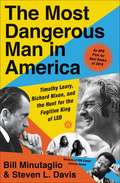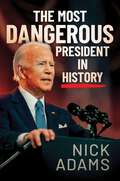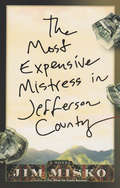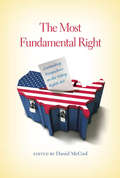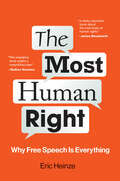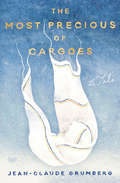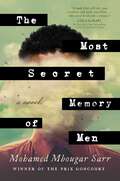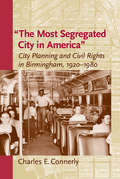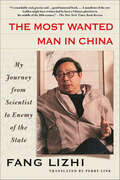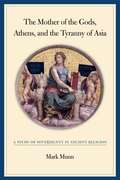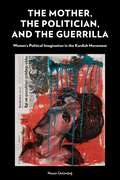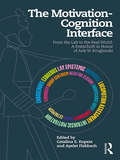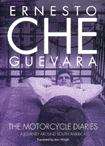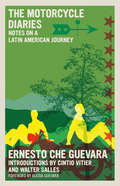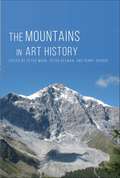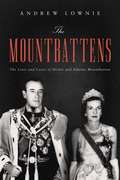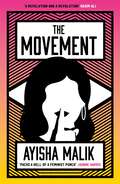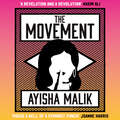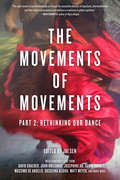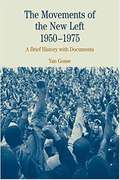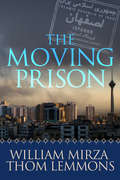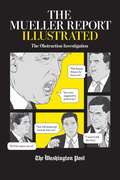- Table View
- List View
The Most Dangerous Man in America: Timothy Leary, Richard Nixon and the Hunt for the Fugitive King of LSD
by Bill Minutaglio Steven L. DavisFrom Bill Minutaglio and Steven L. Davis, authors of the PEN Center USA award-winning Dallas 1963, comes a madcap narrative about Timothy Leary's daring prison escape and run from the law.On the moonlit evening of September 12, 1970, an ex-Harvard professor with a genius I.Q. studies a twelve-foot high fence topped with barbed wire. A few months earlier, Dr. Timothy Leary, the High Priest of LSD, had been running a gleeful campaign for California governor against Ronald Reagan. Now, Leary is six months into a ten-year prison sentence for the crime of possessing two marijuana cigarettes.Aided by the radical Weather Underground, Leary's escape from prison is the counterculture's union of "dope and dynamite," aimed at sparking a revolution and overthrowing the government. Inside the Oval Office, President Richard Nixon drinks his way through sleepless nights as he expands the war in Vietnam and plots to unleash the United States government against his ever-expanding list of domestic enemies. Antiwar demonstrators are massing by the tens of thousands; homemade bombs are exploding everywhere; Black Panther leaders are threatening to burn down the White House; and all the while Nixon obsesses over tracking down Timothy Leary, whom he has branded "the most dangerous man in America."Based on freshly uncovered primary sources and new firsthand interviews, THE MOST DANGEROUS MAN IN AMERICA is an American thriller that takes readers along for the gonzo ride of a lifetime. Spanning twenty-eight months, President Nixon's careening, global manhunt for Dr. Timothy Leary winds its way among homegrown radicals, European aristocrats, a Black Panther outpost in Algeria, an international arms dealer, hash-smuggling hippies from the Brotherhood of Eternal Love, and secret agents on four continents, culminating in one of the trippiest journeys through the American counterculture.
The Most Dangerous Man in the World: Julian Assange and His Secret White House Deal for Freedom
by Andrew FowlerIn June 2024, after fourteen years of house arrest and incarceration, Julian Assange, the Australian journalist the CIA had planned to kidnap or kill, was finally released from the UK&’s top security Belmarsh prison. Years of campaigning by his family and Australian politicians from across the political spectrum had finally paid off: Assange&’s plea bargain with the US Department of Justice produced the legal deal of the century. Instead of serving a possible 175-year jail sentence, Assange walked free. What changed former US President Joe Biden&’s mind after years of appeals and hearings? When WikiLeaks revealed evidence of American war crimes in Iraq, Biden had called Assange a &‘high tech terrorist&’. Why did Biden now believe the time was right to end the pursuit and to cut a deal? Andrew Fowler takes us inside the negotiations with the White House, revealing a startling story of false hope, courage, resolve and the extraordinary resilience of the person Pentagon Papers whistleblower Daniel Ellsberg called the Most Dangerous Man in the World.
The Most Dangerous Man in the World: The Explosive True Story of Julian Assange and the Lies, Cover-ups and Conspiracies He Exposed
by Andrew FowlerThe battle lines are drawn: freedom of speech against the control of the State. The Internet is the battle ground. In this war there will only be one winner. In The Most Dangerous Man in the World, award-winning journalist Andrew Fowler talks to Julian Assange, his inner circle, and those disaffected by him, deftly revealing the story of how a man with a turbulent childhood and brilliance for computers created a phenomenon that has disrupted the worlds of both journalism and international politics. From Assange's early skirmishes with the "cult" of Scientology in Australia to the release of 570,000 intercepts of pager messages sent on the day of the September 11th attacks and on to the visual bombshell of the Collateral Murder video showing American soldiers firing on civilians and Reuters reporters, Fowler takes us from the founding of WikiLeaks right up to Cablegate and the threat of further leaks in 2011 that he warns could bring down a major American bank. New information based on interviews conducted with Assange reveal the possibility that he has Asperger's syndrome; the reason U.S. soldier Bradley Manning turned to an ex-hacker to spill military secrets; and how Assange helped police remove a "how to make a bomb" book from the Internet. The mother of one of his children also talks for the first time about life with Julian when he was setting up WikiLeaks. According to the "Pentagon Papers" whistleblower Daniel Ellsberg, Julian Assange is "the most dangerous man in the world." But just who is Julian Assange, and why is his quest for transparency and freedom of the press so dangerous in the eyes of his detractors? In a fascinating account that reads like a Tom Clancy thriller, Fowler reveals all-what it means, and why it matters. Like The Looming Tower on 9/11 or The Lords of Finance on the collapse of the US economy, The Most Dangerous Man in the World is the definitive, journalistic account of a massive global news event that's changing the face of journalism and the way governments do business.
The Most Dangerous President in History
by Nick AdamsPresident Biden is the most dangerous president in American history.Many Americans still think of Joe Biden as an average guy who supports the working class. But in reality, he has carried out a destructive agenda against our entire system of freedom. He has fully embraced the Green New Deal agenda, along with woke sexual and racial politics, leading to a more divided and poorer country. His weakness on the international stage has created a perilous world. But the danger of Biden goes much deeper than these issues that are hurting us on a daily basis. For one of the first times in US history, we have a president whose motives we cannot trust. In this book, Nick Adams exposes what the media and politicians have been hiding for nearly fifty years. He doesn&’t just make the case that Biden is the most dangerous president in history—he proves it.
The Most Expensive Mistress in Jefferson County: The US Forest Service, Fish and Wildlife, BLM, and Nez Pearce Indian Nation Land Swap Scandal
by Jim MiskoWhat would you do to earn a $10 million profit? Would you be willing to compromise or alter your principles? Hawkins Neilson is about to find out in THE MOST EXPENSIVE MISTRESS IN JEFFERSON COUNTY. The US Forest Service, Fish and Wildlife, BLM and other government agencies have signed on a contract along with 130 ranchers and farmers and the Nez Pearce Indian Nation to exchange more than $400 million dollars of property in the largest land exchange in Idaho history. Hawk has drained his bank account and borrowed more to close this transaction. Can he make it through this last week before closing? On the day of closing, the Indians demand an additional $1 million dollars for one of their properties. Hawk Explodes. This could change his and their lives forever.
The Most Fundamental Right
by Daniel MccoolPassed in 1965 during the height of the Civil Rights movement, the Voting Rights Act (VRA) changed the face of the American electorate, dramatically increasing minority voting, especially in the South. While portions of the Act are permanent, certain provisions were set to expire in 2007. Reauthorization of these provisions passed by a wide margin in the House, and unanimously in the Senate, but the lopsided tally hid a deep and growing conflict. The Most Fundamental Right is an effort to understand the debate over the Act and its role in contemporary American democracy. Is the VRA the cornerstone of civil rights law that prevents unfair voting practices, or is it an anachronism that no longer serves American democracy? Divided into three sections, the book utilizes a point/counterpoint approach. Section 1 explains the legal and political context of the Act, providing important background for what follows; Section 2 pairs three debates concerning specific provisions or applications of the Act; while Section 3 offers commentaries on the previous chapters from attorneys with widely divergent viewpoints.
The Most Human Right: Why Free Speech Is Everything
by Eric HeinzeA bold, groundbreaking argument by a world-renowned expert that unless we treat free speech as the fundamental human right, there can be no others. What are human rights? Are they laid out definitively in the UN&’s Universal Declaration of Human Rights or the US Bill of Rights? Are they items on a checklist—dignity, justice, progress, standard of living, health care, housing? In The Most Human Right, Eric Heinze explains why global human rights systems have failed. International organizations constantly report on how governments manage human goods, such as fair trials, humane conditions of detention, healthcare, or housing. But to appease autocratic regimes, experts have ignored the primacy of free speech. Heinze argues that goods become rights only when citizens can claim them publicly and fearlessly: free speech is the fundamental right, without which the very concept of a &“right&” makes no sense. Heinze argues that throughout history countless systems of justice have promised human goods. What, then, makes human rights different? What must human rights have that other systems have lacked? Heinze revisits the origins of the concept, exploring what it means for a nation to protect human rights, and what a citizen needs in order to pursue them. He explains how free speech distinguishes human rights from other ideas about justice, past and present.
The Most Precious of Cargoes: A Tale
by Jean-Claude GrumbergSet during the height of World War II, a powerful and unsettling tale about a woodcutter and his wife, who finds a mysterious parcel thrown from a passing train.Once upon a time in an enormous forest lived a woodcutter and his wife. The woodcutter is very poor and a war rages around them, making it difficult for them to put food on the table. Yet every night, his wife prays for a child.A Jewish father rides on a train holding twin babies. His wife no longer has enough milk to feed both children. In hopes of saving them both, he wraps his daughter in a shawl and throws her into the forest.While foraging for food, the wife finds a bundle, a baby girl wrapped in a shawl. Although she knows harboring this baby could lead to her death, she takes the child home.Set against the horrors of the Holocaust and told with a fairytale-like lyricism, The Most Precious of Cargoes is a fable about family and redemption which reminds us that humanity can be found in the most inhumane of places.Translated from the French by Frank Wynne
The Most Secret Memory of Men: A Novel
by Mohamed Mbougar SarrLONGLISTED FOR THE 2023 NATIONAL BOOK AWARD A masterful coming-of-age novel and a gripping investigation into the life of a mysterious author who disappeared without a trace, by the first writer from sub-Saharan Africa to be awarded France&’s prestigious Prix Goncourt.Paris, 2018. Diégane Latyr Faye, a young Senegalese writer, discovers a legendary book published in 1938 titled The Maze of Inhumanity. No one knows what happened to the author, T.C. Elimane, once referred to as the &“Black Rimbaud.&” After he was accused of plagiarism, his reputation was destroyed by the critics. He subsequently disappeared without a trace. Curiosity turns to obsession, and Faye embarks on a quest to uncover the fate of the mysterious T.C. Elimane. His search weaves past and present, countries and continents, following the author&’s labyrinthine trail from Senegal to Argentina and France and confronting the great tragedies of history. Alongside his investigation, Faye becomes part of a group of young African writers in Paris. They talk, drink, make love, and philosophize about the role of exile in artistic creation. He becomes particularly close to two women: the seductive Siga, keeper of secrets, and the fleeting photojournalist Aïda. But throughout, a question persists: will he get to the truth at the center of the maze? A gripping detective novel without a detective and a masterpiece of perpetual reinvention, The Most Secret Memory of Men confronts the impact of colonialism and neo-colonialism, the holocaust in Europe, dictatorships in South America and the Caribbean, genocide in Africa, and collaboration and resistance everywhere. Above all, it is a love song to literature and its timeless power.
The Most Segregated City in America": City Planning and Civil Rights in Birmingham, 1920–1980 (Center Books)
by Charles E. ConnerlyOne of Planetizen's Top Ten Books of 2006"But for Birmingham," Fred Shuttleworth recalled President John F. Kennedy saying in June 1963 when he invited black leaders to meet with him, "we would not be here today." Birmingham is well known for its civil rights history, particularly for the violent white-on-black bombings that occurred there in the 1960s, resulting in the city's nickname "Bombingham." What is less well known about Birmingham's racial history, however, is the extent to which early city planning decisions influenced and prompted the city's civil rights protests. The first book-length work to analyze this connection, "The Most Segregated City in America": City Planning and Civil Rights in Birmingham, 1920-1980 uncovers the impact of Birmingham's urban planning decisions on its black communities and reveals how these decisions led directly to the civil rights movement.Spanning over sixty years, Charles E. Connerly's study begins in the 1920s, when Birmingham used urban planning as an excuse to implement racial zoning laws, pointedly sidestepping the 1917 U.S. Supreme Court Buchanan v. Warley decision that had struck down racial zoning. The result of this obstruction was the South's longest-standing racial zoning law, which lasted from 1926 to 1951, when it was redeclared unconstitutional by the U.S. Supreme Court. Despite the fact that African Americans constituted at least 38 percent of Birmingham's residents, they faced drastic limitations to their freedom to choose where to live. When in the1940s they rebelled by attempting to purchase homes in off-limit areas, their efforts were labeled as a challenge to city planning, resulting in government and court interventions that became violent. More than fifty bombings ensued between 1947 and 1966, becoming nationally publicized only in 1963, when four black girls were killed in the bombing of the Sixteenth Street Baptist Church.Connerly effectively uses Birmingham's history as an example to argue the importance of recognizing the link that exists between city planning and civil rights. His demonstration of how Birmingham's race-based planning legacy led to the confrontations that culminated in the city's struggle for civil rights provides a fresh lens on the history and future of urban planning, and its relation to race.
The Most Wanted Man in China: My Journey from Scientist to Enemy of the State
by Fang LizhiThe long-awaited memoir by Fang Lizhi, the celebrated physicist whose clashes with the Chinese regime helped inspire the Tiananmen Square protestsFang Lizhi was one of the most prominent scientists of the People's Republic of China; he worked on the country's first nuclear program and later became one of the world's leading astrophysicists. His devotion to science and the pursuit of truth led him to question the authority of the Communist regime. That got him in trouble. In 1957, after advocating reforms in the Communist Party, Fang -- just twenty-one years old -- was dismissed from his position, stripped of his Party membership, and sent to be a farm laborer in a remote village. Over the next two decades, through the years of the Great Leap Forward and the Cultural Revolution, he was alternately denounced and rehabilitated, revealing to him the pettiness, absurdity, and horror of the regime's excesses. He returned to more normal work in academia after the death of Mao Zedong in 1976, but the cycle soon began again. This time his struggle became a public cause, and his example helped inspire the Tiananmen Square protests. Immediately after the crackdown in June 1989, Fang and his wife sought refuge in the U.S. embassy, where they hid for more than a year before being allowed to leave the country. During that time Fang wrote this memoir The Most Wanted Man in China, which has never been published, until now. His story, told with vivid detail and disarming humor, is a testament to the importance of remaining true to one's principles in an unprincipled time and place.
The Mother of the Gods, Athens, and the Tyranny of Asia: A Study of Sovereignty in Ancient Religion
by Mark Henderson MunnThis is a provocative, daring, and ambitious comparison of Greek and Asiatic ideologies from the time of Midas to the Persian empire. Using the Lydian goddess of sovereignty as a touchstone, Munn demonstrates that divinities were not static types, but were expressions of cultural systems, responding to historical change.
The Mother, the Politician, and the Guerrilla: Women’s Political Imagination in the Kurdish Movement
by Nazan ÜstündağThe Mother, the Politician, and the Guerrilla intervenes in discussions on decolonialism and feminism by introducing the example of the Kurdish Women’s Freedom Movement. Üstündağ shows how the practices and the concepts of the movement contribute to debates on how the past, present, and future can be critically rethought in revolutionary ways.In the movement’s images, figures, voices, bodies, and their reverberations Üstündağ elaborates a new political imagination that has emerged in Kurdistan through women’s acts and speech. This political imagination unfolds between flesh, body, voice, language. It is the result of Kurdish women’s desire to find new ways of being and becoming, between the necessary and the possible.Focusing on the figures of the mother, the woman politician and woman guerilla, Üstündağ argues that the Kurdish Women’s Freedom Movement changes what politics consists of, including its matter, relationality, temporality, and spatiality. Although anchored in the specific Kurdish experiences, the book puts the movement into conversation with feminist political theory, psychoanalysis, Black Studies, Queer Studies, and Decolonial Studies. In solidarity with the Kurdish Movement’s tradition of resistance to History with a capital H that Kurds have built through reiterated performance, the book seeks to establish what new entanglements with wide-ranging thought the movement offers as a provocation for contemporary politics.
The Motivation-Cognition Interface: From the Lab to the Real World: A Festschrift in Honor of Arie W. Kruglanski
by Catalina E. Kopetz Ayelet FishbachThis volume honors the work of Arie W. Kruglanski. It represents a collection of chapters written by Arie’s former students, friends, and collaborators. The chapters are rather diverse and cover a variety of topics from politics, including international terrorism, to health related issues, such as addiction and self-control, to basic psychological principles, such as motivation and self-regulation, the formation of attitudes, social influence, and interpersonal relationships. What these chapters have in common is that they have all been inspired by Arie’s revolutionary work on human motivation and represent the authors’ attempt to apply the basic principles of motivation to the understanding of diverse phenomena.
The Motorcycle Diaries
by Ernesto Che Guevara Aleida GuevaraThe book of the popular movie STARRING GAEL GARCIA BERNALNOW A NEW YORK TIMES BESTSELLERThe young Che Guevara's lively and highly entertaining travel diary, now a popular movie and a New York Times bestseller. This new, expanded edition features exclusive, unpublished photos taken by the 23-year-old Ernesto on his journey across a continent, and a tender preface by Aleida Guevara, offering an insightful perspective on the man and the icon."A journey, a number of journeys. Ernesto Guevara in search of adventure, Ernesto Guevara in search of America, Ernesto Guevara in search of Che. On this journey of journeys, solitude found solidarity, 'I' turned into 'we'."--Eduardo Galeano"When I read these notes for the first time, I was quite young myself and I immediately identified with this man who narrated his adventures in such a spontaneous manner... To tell you the truth, the more I read, the more I was in love with the boy my father had been."--Aleida Guevara"Our film is about a young man, Che, falling in love with a continent and finding his place in it." --Walter Salles, director of "The Motorcycle Diaries.""As his journey progresses, Guevara's voice seems to deepen, to darken, colored by what he witnesses in his travels. He is still poetic, but now he comments on what he sees, though still poetically, with a new awareness of the social and political ramifications of what's going on around him."--January MagazineAlso available in Spanish: DIARIOS DE MOTOCICLETA (978-1-920888-11-4)Features of this edition include:--A preface by Che Guevara's daughter Aleida--Introduction by Cintio Vintier, well-known Latin American poet--Photos & maps from the original journey--Che's personal reflections on his formative years: "A child of my environment."Published in association with the Che Guevara Studies Center, Havana
The Motorcycle Diaries: A Journey around South America
by Anne Wright Ernesto Che GuevaraThe diaries are written by Che Guevara during his riotous motorcycle odyssey around South America at the age of twenty-three.
The Motorcycle Diaries: Notes on a Latin American Journey
by Ernesto Che GuevaraA New York Times bestsellerWith a new introduction by The Motorcyle Diaries filmmaker Walter Salles, and featuring 24 pages of photos taken by Che.The Motorcycle Diaries is Che Guevara's diary of his journey to discover the continent of Latin America while still a medical student, setting out in 1952 on a vintage Norton motorcycle together with his friend Alberto Granado, a biochemist. It captures, arguably as much as any book ever written, the exuberance and joy of one person's youthful belief in the possibilities of humankind tending towards justice, peace and happiness. After the release in 2004 of the exhilarating film of the same title, directed by Walter Salles, the book became a New York Times and international bestseller. This edition includes a new introduction by Walter Salles and an array of new material that was assembled for the 2004 edition coinciding with the release of the film, including 24 pages of previously unpublished photos taken by Che, notes and comments by his wife, Aleida Guevara March, and an extensive introduction by the distinguished Cuban author, Cintio Vitier."A journey, a number of journeys. Ernesto Guevara in search of adventure, Ernesto Guevara in search of America, Ernesto Guevara in search of Che. On this journey, solitude found solidarity. 'I' turned into 'we.'"—Eduardo Galeano"As his journey progresses, Guevara's voice seems to deepen, to darken, colored by what he witnesses in his travels. He is still poetic, but now he comments on what he sees, though still poetically, with a new awareness of the social and political ramifications of what's going on around him."—January Magazine"Our film is about a young man, Che, falling in love with a continent and finding his place in it."—Walter Salles, director of the film version of The Motorcycle Diaries"All this wandering around 'Our America with a Capital A' has changed me more than I thought."—Ernesto Che Guevara, from The Motorcycle Diaries
The Mountains in Art History
by Peter Mark ; Peter Helman ; Penny SnyderThe Mountains in Art History is the first English-language work to focus on mountains as subject matter and source of aesthetic and spiritual inspiration for painters. This collection of original essays is written entirely by Wesleyan University students of art history. The essays examine how artistic representation of mountains has varied through the lens of specific depictions in English and American literature, and consider how images of mountains functioned in conjunction with religion, the sublime, and Romanticism. These essays by student authors adeptly ruminate on works by individuals such as William Wordsworth, John Frederick Kensett, Alexander van Humboldt, Emil Nolde, and Arnold Fanck. Includes an introduction by professor Peter Mark and a helpful appendix of the course syllabus and narrative description.
The Mountbattens: The Lives and Loves of Dickie and Edwina Mountbatten
by Andrew LownieThe intimate story of a unique marriage spanning the heights of British glamour and power that descends into infidelity, manipulation, and disaster through the heart of the twentieth century.DICKIE MOUNTBATTEN: A major figure behind his nephew Philip's marriage to Queen Elizabeth II and instrumental in the royal family taking the Mountbatten name, he was Supreme Allied Commander of South East Asia during World War II and the last Viceroy of India. EDWINA MOUNTBATTEN: Once the richest woman in Britain—and a playgirl who enjoyed numerous affairs—she emerged from World War II as a magnetic and talented humanitarian worker who was loved throughout the world. From British high society to the South of France, from the battlefields of Burma to the Viceroy's House, The Mountbattens is a rich and filmic story of a powerful partnership, revealing the truth behind a carefully curated legend. Was Mountbatten one of the outstanding leaders of his generation, or a man over-promoted because of his royal birth, high-level connections, film-star looks and ruthless self-promotion? What is the true story behind controversies such as the Dieppe Raid and Indian Partition, the love affair between Edwina and Nehru, and Mountbatten's assassination in 1979?
The Movement: 'packs a hell of a feminist punch'
by Ayisha Malik'Original, clever, insightful and packs a hell of a feminist punch. I loved it' Joanne Harris'A revelation and a revolution' Kasim AliWith words come power. But do you speak out or shut up? Everywhere Sara Javed goes - online or outside - everyone is shouting about something. Couldn't they all just shut up? One day she takes her own advice.At first people don't understand her silence and are politely confused at best. But the last thing Sara could anticipate is becoming the figurehead of a global movement that splits society in two.The Silent Movement sparks outrage in its opposers. Global structures start to shift. And the lives of those closest to Sara - as well as strangers inspired by her act - begin to unravel.It's time for the world to reconsider what it means to have a voice. A sharply observed novel, charged with compassion and dark wit, that will spark important conversations about how we live, relate and communicate now.#SILENCEISPOWER---READERS ARE CAPTIVATED BY THE MOVEMENT'Brilliant and thought-provoking''A novel about choices and how women's choices are always subject to critics''Zainab's story will stay with me for years to come''There is a lot to be learnt from this work of fiction''Essential reading''Perfect for this age of noise''A very compelling read'
The Movement: how far will she go to make her voice heard?
by Ayisha Malik'Powerful and profound' Daisy Buchanan'Breathtakingly original... a searing examination of the modern world and its sensibilities' Imran Mahmood__With words come power. But do you speak out or shut up? Everywhere Sara Javed goes - online or outside - everyone is shouting about something. Couldn't they all just shut up? One day she takes her own advice.At first people don't understand her silence and are politely confused at best. But the last thing Sara could anticipate is becoming the figurehead of a global movement that splits society in two.The Silent Movement sparks outrage in its opposers. Global structures start to shift. And the lives of those closest to Sara - as well as strangers inspired by her act - begin to unravel.It's time for the world to reconsider what it means to have a voice. A sharply observed novel, charged with compassion and dark wit, that will spark important conversations about how we live, relate and communicate now.__'Malik makes us care with wry humour and bite' Helen Lederer'A book for, and of, the now' Vaseem Khan
The Movements of Movements: Part 2: Rethinking Our Dance
by Jai SenThis collection provides a bracing window into some of the central ideas to have emerged from within grassroots struggles from 2006 to 2010. Rethinking Our Dance, the second of two volumes, offers a wide range of essays from frontline activists in Afghanistan, Argentina, Brazil, Niger, and Taiwan, as well as from Europe and North America that address the question, "What do we need to do in order to bring about justice and peace?" Contributors include Kolya Abramsky, Ezequiel Adamovsky, Oussenia Alidou, Samir Amin, Chris Carlsson, John Brown Childs, Lee Cormie, Anila Daulatzai, Massimo De Angelis, The Free Association, David Graeber, Josephine Ho, John Holloway, François Houtart, Jeffrey Juris, Michael Löwy, Tomás Mac Sheoin, Matt Meyer, Muto Ichiyo, Rodrigo Nunes, Michal Osterweil, Shailja Patel, Geoffrey Pleyers, Stephanie Ross, and Nicola Yeates.
The Movements of the New Left, 1950-1975: A Brief History with Documents
by Van GosseTracking the developments and commonalities of the civil rights and black power movements, Movements of the New Left, 1950-1975 zeroes in on unrest in a variety of areas, from peace, antiwar, feminism, gay liberation, to other struggles by people of color.
The Moving Prison
by Thom Lemmons William MirzaThe year is 1979 and Ezra Solaiman and his family are trapped in a country in turmoil. Their homeland is increasingly ruled by Islamic fundamentalists who are becoming a law unto themselves. The Solaimans plan their escape only to have Ezra captured and imprisoned on trumped-up charges. Unsure just who his enemies are, Ezra is desperate for a way out--out of prison, out of Iran, out of the chaos his life has become. The Moving Prison is a riveting tale of revolution and revelation, of failure ... and faith.
The Mueller Report Illustrated: The Obstruction Investigation
by The Washington PostWritten and designed by the staff of The Washington Post and illustrated by artist Jan Feindt, The Mueller Report Illustrated: The Obstruction Investigation brings to life the findings of special counsel Robert S. Mueller III in an engaging and illuminating presentation.When it was released on April 18, 2019, Mueller&’s report laid out two major conclusions: that Russia&’s interference in the 2016 presidential election had been &“sweeping and systematic&” and that the evidence did not establish that Trump or his campaign had conspired with the Kremlin. The special counsel left one significant question unanswered: whether the president broke the law by trying to block the probe. However, Mueller unspooled a dramatic narrative of an angry and anxious president trying to control the criminal investigation, even after he knew he was under scrutiny. Deep inside the 448-page report is a fly-on-the-wall account of the inner workings of the White House, remarkable in detail and drama. With dialogue taken directly from the report, The Mueller Report Illustrated is a vivid, factually rigorous narrative of a crucial period in Trump&’s presidency that remains relevant to the turbulent events of today.
